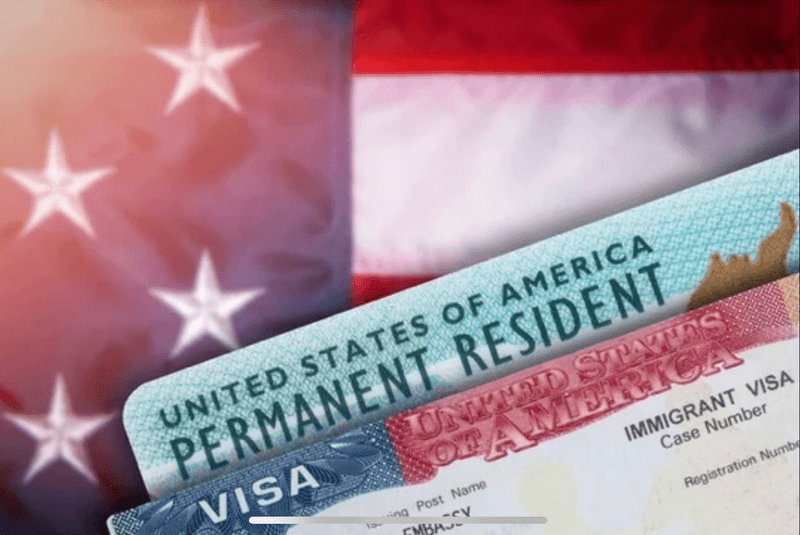The Ultimate Green Card Interview Question Guide For Applicants in the U.S.

If you’re preparing for a green card interview, it can feel like there’s a mountain of information to take in. You’re not alone in this journey — many have walked this path before and successfully navigated the process.
In fact, knowing what kind of questions to expect and how to answer them can significantly improve your chances of success. This guide is here to help you do exactly that: prepare effectively for your green card interview.
This article will provide a list of possible questions under various categories. By familiarizing yourself with these topics ahead of time, your confidence will grow leading up to the big day.
Personal Information Questions
During your green card interview, the USCIS officer will ask you various personal information questions. These are designed to confirm the details submitted in your green card application, ensure a bona fide relationship, and eligibility for the green card category under which you applied.
This could include questions like:
- What is your full legal name?
- What is your date of birth?
- Where were you born?
- Where do you live now?
- Who lives with you?
- Are you married?
- Do you have children?
It’s crucial to answer these accurately, as discrepancies may raise doubts about the authenticity of your application.
You should also bring relevant supporting documents– such as marriage certificates or court dispositions – which could serve as proof and make navigating through what may seem like intimidating green card interview questions easier.
Family or Marriage-Based Green Card Questions
Opening up about your family and relationships helps establish the legitimacy of your relationship or familial ties. The immigration officer at a family or marriage-based green card interview will ask you questions about your marriage or partnership and your extended family. This interrogation confirms that your marriage is bona fide and not just to obtain a green card.
Here are four key areas that the interviewer may touch upon:
- The history of your relationship: The officer may require specifics about how you met, how long you dated before getting married, the story of your engagement, memorable events like trips together, etc.
- Your wedding: The interviewer will delve into specifics about your wedding, including what your wedding was like, what food was served, who attended, and whether or not you took a honeymoon, etc.
- Your relationship with each other’s families: For instance, if one spouse is foreign-born, has the U.S.-born spouse met their foreign-born partner’s family? How often does that happen?
- Common activities/daily routine: Questions can range from ‘Have both spouses gone to see a movie recently?’ to inquiries regarding shared hobbies or routines.
Remember: Consistency in responses between spouses (if applicable) is vital during these interviews since discrepancies can raise red flags for fraud detection. It might seem intrusive, but being prepared with clear, honest answers can streamline this complex process significantly.
Employment and Income Questions
The employment and income part of the conversation can often feel like a job interview. These questions aim to understand your ability to financially support yourself in the United States without requiring public benefits.
You may answer questions about the following topics:
- Current Occupation: Be prepared to discuss what you do for a living. You should be able to provide details about your role, responsibilities, income level, and even future career prospects.
- Past Employment: USCIS will also want to verify your past work experience. This could include asking about previous roles or employers in your home country or the U.S., if applicable.
- Financial Stability: Expect questions regarding how you plan on supporting yourself financially in America. This might involve discussing savings, assets, or even potential job offers you’ve received.
- Tax Returns: If you’ve been working in the U.S., there’s a good chance they’ll ask about tax returns as proof of income.
It’s important to answer these questions truthfully and convincingly and demonstrate that you’re unlikely to become a public charge. An experienced immigration attorney can guide you through this process and help prepare effective responses that align with your green card application’s overall narrative.
The goal here isn’t just passing the interview, but doing so in a way that strengthens your entire case before USCIS.
Legal and Criminal Record Questions
During your interview, you may be asked about past criminal activities, immigration violations, interactions with law enforcement, or issues impacting your ability to become a lawful permanent resident.
The interviewing officer aims to establish whether violations could indicate potential harm to U.S. society, a lack of commitment to abide by its laws, and even whether you meet basic eligibility requirements
During this phase of questioning at your green card interview, the questions may span from inquiries about previous arrests—even if they didn’t lead to convictions—to traffic tickets and domestic violence complaints.
Character-Related Questions
Like criminal record questions, character-related questions are meant to assess eligibility for lawful permanent resident status and ensure that individuals granted green cards will contribute positively and responsibly within their communities.
Some sample questions you can expect include:
- Do you follow U.S. laws?
- Have you ever claimed to be a U.S. citizen?
- Do you believe in equality for all people regardless of race, religion, or nationality?
- Have you ever supported a banned organization?
What Happens After the Green Card Interview?
So, you’ve made it through the rigorous questioning – what’s next in this journey towards becoming a lawful permanent resident?
After the green card interview, there are several possible outcomes, but: usually, your application is approved or denied.
If your application is approved, congratulations! Your green card will arrive in the mail.
On the other hand, if your application is denied, don’t lose heart; you will receive a letter stating why your application was rejected. This could be due to incomplete documents, failure to meet eligibility requirements, or even errors in the application form itself.
Carefully read this denial letter for information on what went wrong and how you can address these issues. Depending on the denial, you may consider an appeal, motion to reopen or reconsider, or even refiling the application anew. There is the possibility of being referred to the immigration court for removal proceedings, so don’t ignore any communication from USCIS!
If you need guidance in handling your green card application or denial, turn to the Law Office of Lina Baroudi. As an experienced immigration attorney, Lina Baroudi can provide the support and legal experience you need to navigate the immigration process. Contact us today for a consultation, and let us guide you toward achieving your immigration goals.
